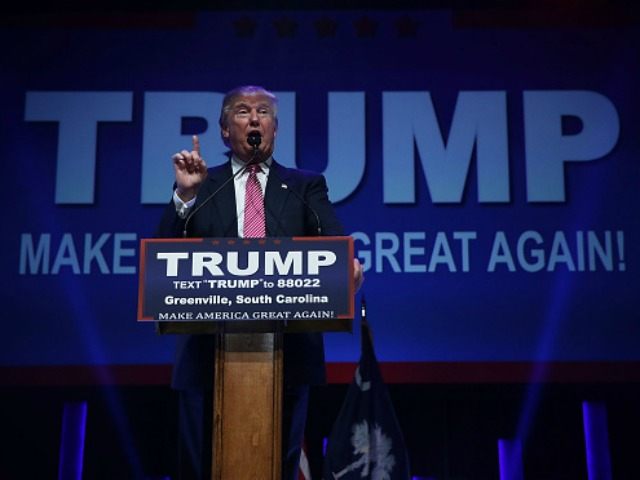The latest dustup at the Republican “debates” in South Carolina has “conservatives” pointing fingers at Trump supporters and shouting, “See, I told you Trump is no conservative. He is a Democrat in disguise. Why, he just insulted George W. Bush and the entire ‘conservative’ basis of American foreign policy over the last thirty years.”
The establishment plants in the audience booed Trump for his heresy, and the establishment pundits in the media are now circling the blood in the water. Trump is doomed, again. Bring on Jeb!
But maybe it was their blood in the water, and the shark may be Donald Trump.
Trump, again, has tapped into a lingering doubt among real American conservatives about American commitment to endless wars, expensive nation building in foreign lands, and futile foreign adventurism.
You see, it was not that long ago that conservative American foreign policy makers doubted the wisdom of American imperialism. The Old Right was defined in part by their commitment to the traditional American foreign policy of non-intervention. It spawned the Anti-Imperialism League of the late 19th and early 20th centuries, led to the American First activists during the months leading to American involvement in World War II, created a split in conservatives in the 1950s over the American response to the Soviet Union, and spawned the modern conservative opposition to the broad-based American policy of endless military intervention in the Middle East.
If you don’t think so, read the columns of Pat Buchanan, a man no one would confuse with a pinko or Birkenstock-wearing anti-war hippie.
In fact, the progressive presidents who have gone a long way to screwing up America—all of the following are included in my book 9 Presidents Who Screwed Up America and Four Who Tried to Save Her—are the earliest advocates and most vocal proponents of destructive wars that have spawned the greatest increase in federal power.
Teddy Roosevelt, the first progressive president, used unconstitutional power to gain American access to the Panama Canal in 1903. He knew what he was doing was illegal, yet did it anyway because he wanted Congress to debate him, not the Constitution.
Woodrow Wilson’s war to make the world “safe for democracy” led to the deaths of 100,000 American soldiers and the rapid expansion of federal power through unconstitutional government regulatory agencies. Wilson would not be confused for a conservative.
Franklin Roosevelt seized the wartime “emergency” created by World War II to run for an unprecedented third term and then double down on Wilson’s unconstitutional executive measures by putting them on steroids during World War II. Those who voted for FDR to abolish bread lines had to wait in line for sugar during World War II. And then we got the “Second Bill of Rights” after King Franklin was elected for a fourth term in 1944. We must not forget that Roosevelt wanted the United States to get involved in Europe before 1941. He had already shredded the Constitution with the New Deal; World War II finished it off by burning the scraps.
Harry Truman abandoned all semblance of congressional control of “war-making” by insisting that the United States needed to get involved in the Korean War because Americans needed to uphold the “principles of the United Nations” through a “police action” to end communist aggression in Korea. This was necessary, Truman said, “for the defense of your homes and your way of life. . . . All of us will have to pay more taxes and do without things we like.”
But not to worry. Truman reassured Americans that this was not a sacrifice, but “an opportunity, an opportunity to defend the best kind of life that men have ever devised on this earth.” Sounds peachy, and who wouldn’t want to steer clear of those imaginary North Korean bombers flying overhead. Truman revived World War II price controls and government direction of the economy. War has a tendency to bring out the best in progressive mentality.
Is this “conservatism”? If you listened to either Bush president or any of the mainstream candidates on the South Carolina stage, you would think so. It would seem that Wilson was George W. Bush’s speechwriter during most of his administration.
But Trump and millions of real American conservatives know better.
Contrast this hall of shame to the numerous statements every president who hailed from the founding generation—Washington, John Adams, Jefferson, Madison, and Monroe—made about foreign “entanglements” and you get a good picture of where they would stand on the issue of American military adventurism in the modern age. That doesn’t include the presidents from the next generations of Americans, those like J. Q. Adams, Martin Van Buren, John Tyler, Zachary Taylor, and Franklin Pierce who made explicit their dedication to the traditional American foreign policy of non-intervention.
Trump is in far better company, and he has made the right enemies.
If American conservatives are serious about curtailing unconstitutional government, high taxes, and bloated federal spending, perhaps it is time they take a look at all federal red ink, including the billions spent on maintaining over one hundred American military installations across the globe, a far flung American empire, and the cost of war on American liberty. If we don’t get serious, we won’t need the founding generation as an example. We have a better one in Rome or sixteenth-century Spain.
Brion McClanahan is the author of the newly released, 9 Presidents Who Screwed Up America–and Four Who Tried to Save Her.

COMMENTS
Please let us know if you're having issues with commenting.